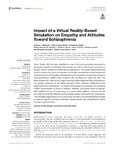Impact of a virtual reality-based simulation on empathy and attitudes toward schizophrenia

View/
Use this link to cite
http://hdl.handle.net/2183/32362
Except where otherwise noted, this item's license is described as Creative Commons Attribution 4.0 International License (CC-BY 4.0)
Collections
- Investigación (FCS) [1295]
Metadata
Show full item recordTitle
Impact of a virtual reality-based simulation on empathy and attitudes toward schizophreniaAuthor(s)
Date
2022-05-04Citation
Marques AJ, Gomes Veloso P, Araújo M, Simões de Almeida R, Correia A, Pereira J, Queiros C, Pimenta R, Pereira AS and Silva CF (2022) Impact of a Virtual Reality-Based Simulation on Empathy and Attitudes Toward Schizophrenia. Front. Psychol. 13:814984.
Abstract
[Abstract] Virtual Reality (VR) has been identified as one of the most promising resources for developing empathy towards stigmatized groups as it allows individuals to experience a situation close to reality from another person's perspective. This quasi-experimental study aimed to examine the impact on empathy, knowledge, and attitudes towards people with schizophrenia of a VR simulation that reproduces the experience of psychotic symptoms while performing a cognitive task compared with watching a 2D video and, thus, how these experiences could reduce stigma towards people diagnosed with schizophrenia. The sample comprised of 102 higher education health students, distributed by the experimental and control groups. The impact of the program was measured by completing multiple questionnaires on levels of empathy, attitudes, and mental health knowledge. Both methods (VR and 2D video) were, to a certain extent, effective. However, VR was more effective at eliciting attitudes and knowledge change compared to the control group. These findings suggest that not only VR but also 2D videos could be interesting strategies to enhance empathy and improve attitudes towards people with schizophrenia in higher education health students.
Keywords
Attitudes
Empathy
Schizophrenia
Stigma
Virtual reality
Empathy
Schizophrenia
Stigma
Virtual reality
Editor version
Rights
Creative Commons Attribution 4.0 International License (CC-BY 4.0)
ISSN
1664-1078






